#like yeah there's some air of legitimacy here but for a significant number of people this is me celebrating take-your-blorbo-to-school day
Explore tagged Tumblr posts
Text
just realized how fucking funny it is that like. yeah scott thompson's gonna be doing an event on campus next semester and i've already accepted that most students don't know who he is (yet). however. it only just dawned on me that like. a significantly large percentage of the people who recognize the name scott thompson at my college aren't gonna be like "oh the comedian from kids in the hall" but instead be like "oh that's jessamine's guy!"
#like yeah there's some air of legitimacy here but for a significant number of people this is me celebrating take-your-blorbo-to-school day#shoutout to my roommate last year who has never seen a kids in the hall sketch but knows too much about bruce and scott and paul#just from me talking about them like they're my uncles#but yeah like i'm the only one bringing up scott ever in my comedy classes rn#and he's obviously gonna get more recognition now that the school knows they have to get people interested in this event#but even still. all this is specifically tied to me. so in the minds of all these gen z college students#they know scott as being JESSAMINE'S friend and not the other way around like it would be almost anywhere else#this is gonna be such a funny dynamic i'm so excited
9 notes
·
View notes
Text
[QZGS meta] what’s in an OP? dawning glory (pt 1)
or, why TKA S2′s OP is actually really good
{The King’s Avatar season 2 premieres in less than 24 hours!}
(part 2) (part 3)

Ever since I got into The King’s Avatar, I’ve always wondered what a “classic-anime-style” TKA opening would look like. OPs are something I pay a lot of attention to, both for the sheer enjoyment and hype as well as the deeper story and symbolism they may allude to. And although I enjoy the S1 and OVA OPs for what they are, I always wanted an OP that really followed the tried-and-true formulas, an OP that gave a proper look at what the series was really about, an OP that had a lot to dig into and analyze.
S2 brought us this kind of OP, finally, and I’m very excited to see it. Heavily inspired by the “What’s in an OP?” youtube series by Mother’s Basement, I really wanted to try and break down this OP. Because things got very long, this is only part 1; the other 2 parts are linked above and below.
Some of the points I bring up may be reading too deeply, but whether some of these details were intentional or not, their meanings and effects are still worth analyzing. Also as a warning, there will probably be novel spoilers.
For reference, watch and read the lyric translation here.
With all that said, let’s jump right in.



We open with some very nice shots of the morning light streaming in, shining on the gamers’ tools of the trade. Right away, the new animation studio promises us a visual treat - the lighting and colors are excellent. Although the props are unmoving and there are no living beings in these shots, the changing angle of the light adds motion to the scene, giving the impression of a sped-up sunrise. This accompanies the music well, which starts out muffled and distant, and gradually comes into clarity. From the very beginning, the OP grabs our attention and holds it, building our anticipation for what’s to come.
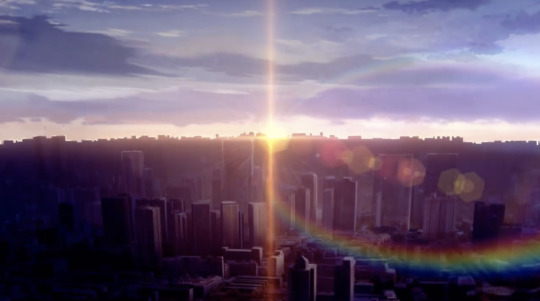

Now we cut to outside, atop a roof, and we get a proper look at the sunrise - only for a brief moment, though, as Ye Xiu’s hand quickly comes up to block the blinding light. “Anime protagonist staring at sunrise” is a pretty common trope, but I think it’s used to nice effect here - we’re introduced immediately to the “dawn” motif that underlies this entire OP (it’s even in the title). It’s a suitable motif for this arc of the story, because this is where Ye Xiu finally has the concrete goal of building up his own team - this is truly the dawn of Team Happy.
I like how it’s Ye Xiu’s hand that’s the first thing we see of him, or of anyone. As a pro, his hands are the most important part of himself; his hands are also one of the first things that Chen Guo notices about him when she first meets him.
Furthermore, this view provides a nice natural transition to the next shot, in which we finally get to see him properly.
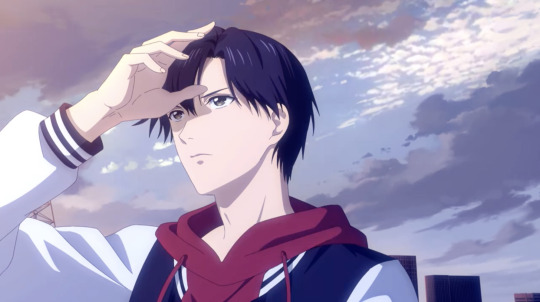

Look at how pretty the sky looks! Look at how pretty his smile looks!
After the first few seconds of pure buildup in the music, the beat kicks in at the exact same time as his hair begins to blow in the wind. I think it’s very important for the visuals and the music to sync together in an OP, simply because of the raw impact this has on the viewer - they reinforce each other’s effects. Both components of an OP need to work well together in order to create something greater than the sum of the parts. It’s just very exciting, when you can sit back and think “oh yeah, it’s all coming together.”
Ye Xiu stares thoughtfully at the sunrise for a few moments, before breaking into a soft, relaxed smile (right on the second four-count after the beat starts). It’s not one of his mocking smiles, or his shamelessly confident smiles - here he’s just genuinely happy and hopeful at what the future has in store.
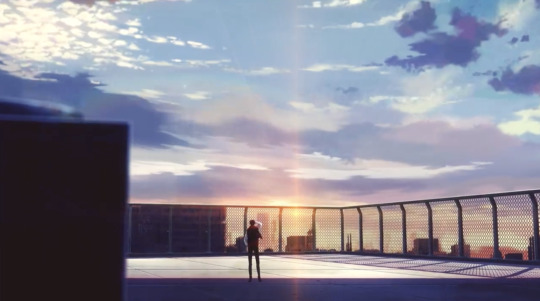

We see him lower his arm, and then the camera pans upward to a shot of the new series logo for Season 2. This pan-up to title card is also a fairly standard technique, but hey, it’s effective and efficient at getting us ready.
Speaking of the new logo: it’s basically the same as the old, but I was shocked to see just how prominent the English title “The King’s Avatar” is now. Honestly, it’s really exciting to see - feels like it adds some legitimacy to our small English fandom, and it’s also so cool, knowing how the title “The King’s Avatar” became the official English name almost by accident - we could have easily ended up with something much less interesting. However I do think they could have positioned the text a little better, because I and others keep reading “The King’s Iavatar” haha

As the dawn shifts more into morning, we refocus on Happy Internet Cafe, the origin of it all. Notice the new green leaves on the tree: our story began on a snowy winter, but we’re now firmly in spring, a time of new beginnings.
The music excitement level settles down a little as we enter the first verse, and here we get a montage of many of the to-be Team Happy members. Although each shot is fairly short, each manages to tell a story, conveying a good amount of information about the character in question. One of TKA’s strengths is its large cast of well-developed characters, and I’m really glad to see that they’re not completely flattened out in this opening montage.
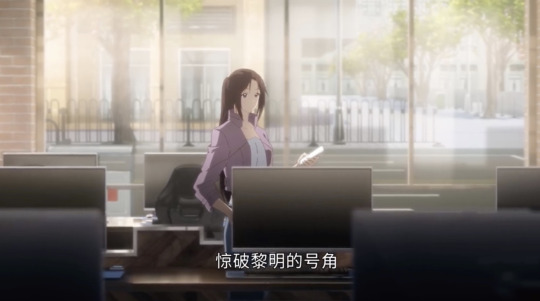
Here we see Chen Guo, presumably opening up the cafe for the day. However, by the time she comes down here to do this, it seems that Tang Rou has already been awake and training for a while.

Like Ye Xiu, the first thing we see of Tang Rou is her hand, a parallel that perhaps emphasizes how deep Ye Xiu’s influence on her is and how she wishes to learn from and surpass him. The nimbleness of her fingers on the keyboard definitely evokes the image of a pianist - a subtle clue for the future.
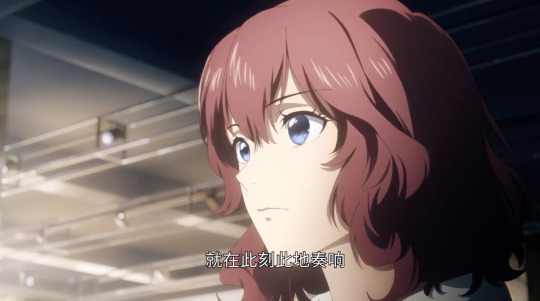
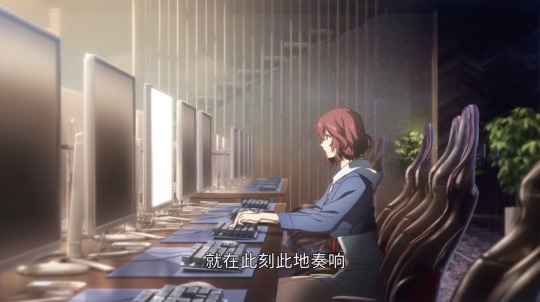
Look at her straightened back and serious eyes - her posture and expression say it all. Awake, alert, steady, calm, as she continues to strive for improvement.
The lyric for this part is roughly, “the bugle call to split open the dawn is sounding right here and now.” As mentioned, it’s here at Happy Internet Cafe that it all begins.
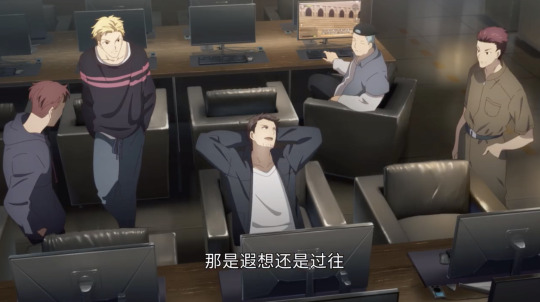
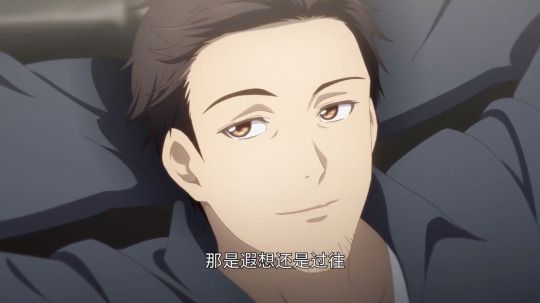

From one internet cafe to another, it’s Wei Chen and his bros! Notice how he’s at the center of their little group, in both position and attention - we immediately get the sense that he’s their leader. Slouched against the couch (which seems to be built more for comfortable lounging than proper gaming), hands behind his head, glancing between his friends, an easy smile, it all gives off a relaxed, casual air of confidence.
Still, in contrast to the seemingly light-hearted mood of this scene here, the accompanying lyric is somewhat melancholy: “were those daydreams or the past?”
When Wei Chen’s character design came out, a lot of people were surprised at how young he seemed to look, and he has barely any stubble. But with this close-up of his face (which is specifically timed to “or the past”), the lines under his eyes are clear to see. Combined with the lyric, there’s suddenly something sad beneath his smile here. He’s not young anymore.
Notice the one screen that’s turned on behind him - clearly an image of Glory. Despite everything, he couldn’t bring himself to leave this world entirely.
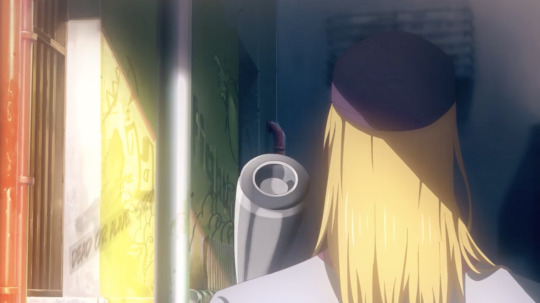

Where the hell is Steamed Bun? Why does he have a bat? We just don’t know. We don’t even have any lyrics to give us a hint. He’s a real-life Brawler, totally incomprehensible. Even the camera shakes a bit erratically as it tries to follow his movement. Honestly, isn’t this just the best way to sum up his character?
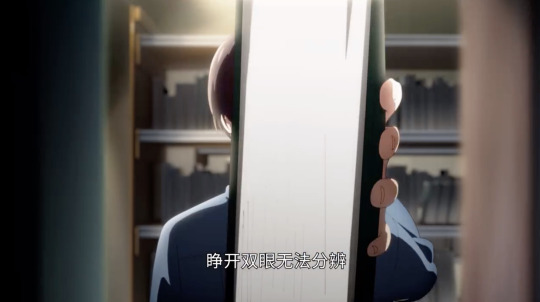

Our favorite math nerd Luo Ji, in a library of course. The shot begins with everything blocked off by the books, and it’s only when he pulls out one of the books (the black-to-light is timed with the lyric “I open my eyes”) that we’re able to see him. He’s still framed by the books in this shot, because he’s first and foremost still a student. For now and for a long time to come, his studiousness and mathematical ability will be what defines him and his contributions to Team Happy.
Still, he looks thoughtfully at the book in his left hand. Maybe his contributions can go farther. Pay attention to his character Concealed Light when we see him later.
I can’t say if there’s a significance to the woman passing by, but it serves its purpose as a transition to the next scene.

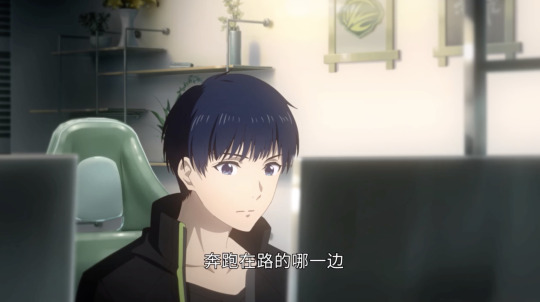
Qiao Yifan! From the logo in the back, as well as his uniform and color scheme, you can see he’s still at Tiny Herb here. He looks determined and focused on his screen at first. When he blinks, though, his gaze subtly shifts to the side and down. Something is distracting him; he’s not quite as certain as he might appear at a glance.
The lyric here is “[I can’t tell] what side of the road I’m running on,” an apt reflection of his current, conflicted and somewhat precarious situation. He’s on a championship team right now, a place that so many would envy. But he feels much more at home with the ragtag crew from Happy. But what prospects do they have? But it’s not like he has much of a place in Tiny Herb right now either…


From Qiao Yifan looking to the side, we cut to An Wenyi looking to the side - our eyes are able to very naturally follow the transition. Although blurry at first, we soon see that he’s looking at a figurine of Immovable Rock - the number one Cleric in Glory, An Wenyi’s idol. He looks at it thoughtfully for a moment, brows furrowed, before turning away and closing his eyes. As though in resignation, knowing he’ll never be able to reach that level.
The lyric is, “do I understand” - a very short line, with the note held out.
An Wenyi is the logical one; he’s the one who understands. He understands his current position, he understands that he has no hope as a pro with his current skill, he understands that the chance Happy is offering him is a once-in-a-lifetime kind of opportunity for someone like him. It’s a decision he considers carefully, he’s unafraid to ask bold questions about the practicality of what Chen Guo and Ye Xiu are trying to do, but in the end he knows this isn’t something that he can pass up.
I like An Wenyi’s character arc a lot. There’s a lot of worry and self-doubt in his expression as he looks at that figurine; there’s a lot of sadness as he turns away. Even through Season 10, this aspect of him doesn’t just magically disappear - he has to deal with this reality of being Happy’s weak point. His logical mind is both his greatest strength and his greatest weakness.

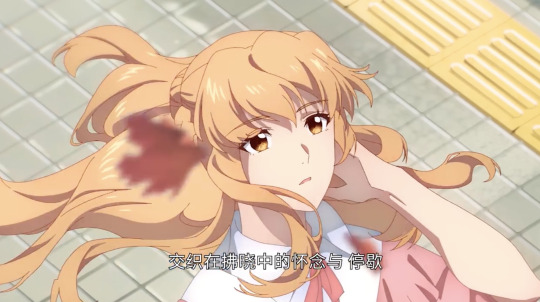
From An Wenyi’s closed eyes, we cut to Su Mucheng’s downcast eyes - another natural eye-focused transition. She looks up as the wind picks up around her, blowing her hair and scattering leaves.
Notice that she’s not wearing her Excellent Era uniform here. Her dress reminds me of her outfit from the prequel movie, actually - color scheme, sleeves, bow, length, cut, etc.
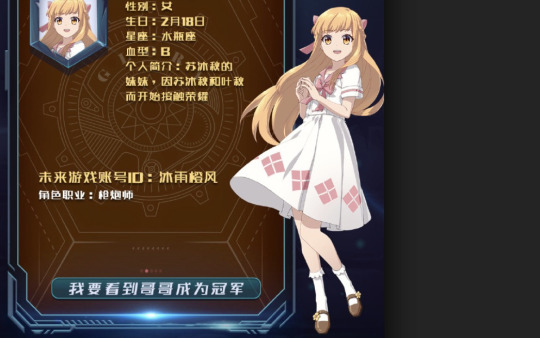
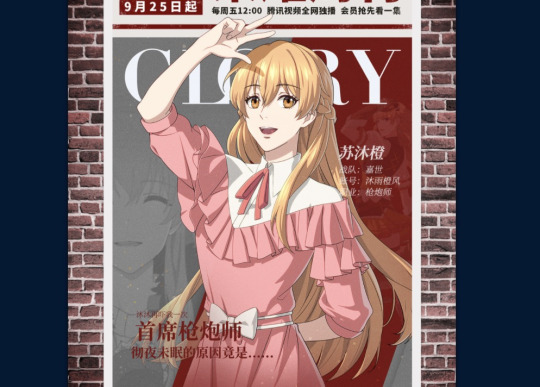
It’s a style calling back to younger, simpler times. The light pink color adds to that effect as well.
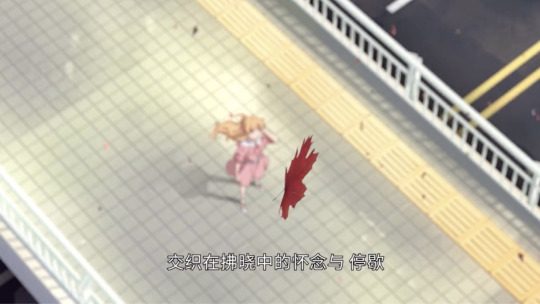
As the camera pulls out, we’re able to see just how alone she is, isolated from the cars passing beneath her, not a single other person nearby. And at this point in the story, she really is rather alone; she doesn’t really have any allies on the team, and her only escape is to play in the game with the Happy crew.
The wind is scattering many leaves, and she blurs into the background as the camera focuses on one drifting red maple leaf in particular.
Blatant symbolism is blatant (it’s not even fall right now, it should be early spring…). Still, it’s a convenient shorthand to reference many things. One Autumn Leaf, Ye Xiu’s account and identity for a decade, now snatched away. The symbol of Excellent Era and those earliest hopes and dreams, now lost to the wind. It could even reference Su Muqiu himself, the boy with “autumn” in his name, now lying in eternal rest.
The lyric is, “interwoven in the dawn, those memories and rests.” The past is now past, far out of reach; all we can do is look up and reminisce on what once was.
Over the course of these shots, you can see the passage of the morning. The earlier characters are illuminated by a golden glow, but by the time we reach Su Mucheng, she’s standing in full daylight. Here we end section 1 (verse 1), and move onto the next part of the song.
Thanks for reading so far!
(part 2) (part 3)
28 notes
·
View notes